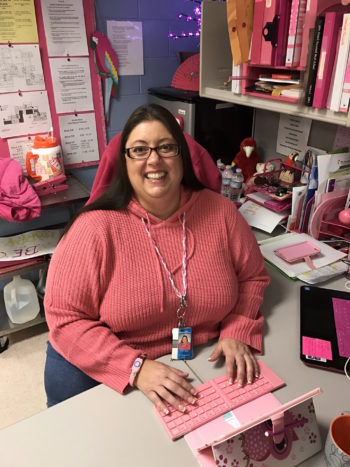 About four years ago, Heidi Hines, a paraeducator at John Stark Regional High School and the president of the John Stark Support Personnel Association (JSSPA) in New Hampshire, walked into the principal’s office and had a conversation with Christopher Corkery, the school’s new principal at the time. The conversation centered on elevating the professional status of Education Support Professionals (ESP).
About four years ago, Heidi Hines, a paraeducator at John Stark Regional High School and the president of the John Stark Support Personnel Association (JSSPA) in New Hampshire, walked into the principal’s office and had a conversation with Christopher Corkery, the school’s new principal at the time. The conversation centered on elevating the professional status of Education Support Professionals (ESP).
“My goal was to raise the bar,” says Hines, who pursued more professional development opportunities that would help ESPs become even more accomplished.
That conversation eventually crossed into negotiations with the school district, the School Administrative Unit 24. On the bargaining table was professional development paid for by the district coupled with a five percent pay increase upon completion of the courses.
With guidance and support from NEA-New Hampshire, the district agreed. As an added bonus, these courses counted toward district-required professional development hours. Some courses went toward recertification or to demonstrate competency for a paraprofessional’s initial certification, too.
“The SAU is progressive,” says Hines of her school district, “because they’re asking something of us and giving us the resources to get it done.”
With input from JSSPA, the school district developed a curriculum, such as “The Writing Teacher,” a course designed for paraeducators who write often or have not written since they were students themselves. All the courses are open to the full bargaining unit, which includes food service workers and custodial staff, and are taught at the high school or school district office.
This opportunity has created a more collaborative environment between teachers and ESPs," Hines says, “Now, teachers are working more with paras because they’re becoming well-rounded—they’re assets in the classroom serving teachers and students.”
For Hines, she is good at writing, and says she needs to improve her math and science skills.
The stakes for Hines and her peers to complete the coursework are high. The paraeducator explains that if her professional development portfolio is incomplete she could be out of a job. She says, however, “I wouldn’t change this direction. I want our paraprofessionals to gain respect through their accomplishments, which will better serve classroom teachers and students.”
Working Together
Achieving paid professional development for an ESP local is few and far between. In many districts across the nation the opportunity to fully utilize ESPs as educators is missed when their professional development is ignored. Even in the case of paraeducators, it is common to have an unpaid leave day while teachers have a professional development day.
 Heidi Hines
Heidi Hines
Hines, however, is confident that others can do it, too. “Part of making this happen is developing a good relationship with your principal,” she says. “I can’t speak highly enough of my principal and our shared vision in wanting us to be better professionals.”
As union president, she still may have to go head-to-head with her principal, but it’s all about her approach to help maintain a good rapport, she says. “We can disagree, but we don’t have to be angry,” she says. “It’s not personal. It’s about solving a problem.”
With this problem-solving mindset everyone wins, and winning right now are the students, teachers, and ESPs at John Stark Regional High School.
Roxanne Dove, director of NEA’s ESPQ department remarked, "As Dr. James P. Comer at Yale Child Development Center says, when you increase the learning of adults in school you increase the learning if students. Congratulations to The NH ESP for elevating their careers and increasing student learning."







